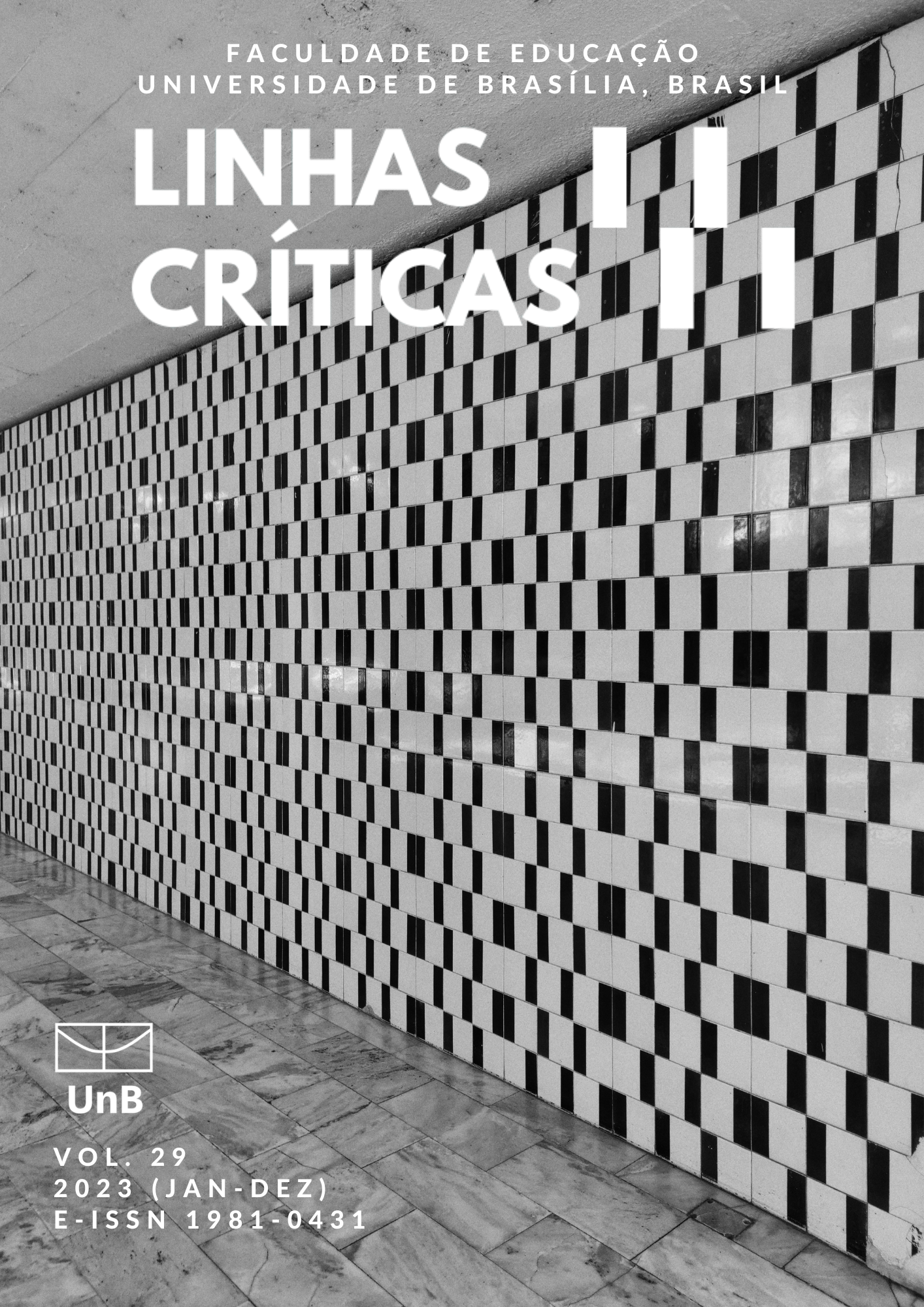Experimenting with the qualitative method: an ethnographic experience exercise
DOI:
https://doi.org/10.26512/lc29202347013Keywords:
Teaching strategy, Qualitative research, Ethnography, ExperienceAbstract
The study to promote debate about the teaching of qualitative research methods based on an ethnographic experience. This is a theoretical-empirical study that was conducted involving the experience of doctoral students in an ethnographic observation practice in a commercial establishment. After the experience, the perceptions of the doctoral students were systematized into thematic areas; it is noteworthy that the ethnographic experiential proposal was configured as a strategy to stimulate the teaching of ethnography, since the doctoral students had the opportunity to get closer to the phenomenon of study and identify possible elements that are characteristic of the said method.
Downloads
References
Alcadipani, R. (2014). Confissões etnográficas: fracassos no acesso a organizações no Brasil. Revista Brasileira de Estudos Organizacionais, 1(1), 64–87. https://doi.org/10.21583/2447-4851.rbeo.2014.v1n1.31
Andion, C., & Serva, M. (2006). A etnografia e os estudos organizacionais. Em C. K. Godoi, R. Bandeira-De-Mello, & A. B. Silva. (Orgs.). Pesquisa qualitativa em estudos organizacionais: paradigmas, estratégias e métodos (pp.147-179). Saraiva.
Barbosa, M. A. C., Neves, F. E. B., Santos, J. M. L., Cassundé, F. R. De S. A., &Cassundé Júnior, N. F. (2013). “Positivismos” versus “Interpretativismos”: o que a Administração tem a ganhar com esta disputa? Organizações em contexto, 9(1). https://doi.org/10.15603/1982-8756/roc.v9n17p1-29
Cabral, J de P. (2008). Sem palavras: etnografia, hegemonia e quantificação. Mana, 14(1), 61-86. https://doi.org/10.1590/S0104-93132008000100003
Caliman, N. F., & Costa, R. R. C. (2008). Os Desafios da Pesquisa Etnográfica na Administração: uma Análise a partir de Artigos Publicados de 1998 a 2007. Anais do XXXII Encontro da Associação Nacional de Pós-Graduação e Pesquisa em Administração– ANPAD.
Cançado, M. (1994). Um estudo sobre a pesquisa etnográfica em sala de aula. Trabalhos em Linguística Aplicada, (23). https://periodicos.sbu.unicamp.br/ojs/index.php/tla/article/view/8639221/6817
Cavalcanti, M. F. R. (2017). Diretrizes para pesquisas qualitativas em estudos organizacionais: controvérsias e possibilidades. Administração: Ensino e Pesquisa, 18(3), 457-488. https://doi.org/10.13058/raep.2017.v18n3.522
Cefaï, D. T. (2010). Unpragmatismeethnographique: L’enquetecooperative et impliquee. Em D. T. Cefaï. L’Engagementethnographique (pp. 447-472). Éditions de l’École dês hautesétudes em sciencessociales.
Costa Filho, E., Gomes, M. A. D. A., & Teixeira, R. M. (2019). A etnografia na pesquisa emadministração: Análise da produção científica nacional de 2000 a 2015. Revista de Empreendedorismo e Inovação Sustentáveis, 4(3). https://repositorio.ifs.edu.br/biblioteca/handle/123456789/1278
Cunliffe, A. L., &Alcadipani, R. (2016). The Politics of Access in Fieldwork: Immersion, Backstage Dramas, and Deception. Organization Research Methods, 1(27). https://doi.org/10.1177/1094428116639134
Czarniawska, B. (2008). Organizing: how to study it and how to write about it. Qualitative Research in Organizations and Management: an International Journal, 3(1), 4-20. https://doi.org/10.1108/17465640810870364
Denzin, N. K., & Lincoln, Y. (org.). (2006). Introdução: a disciplina e a prática da pesquisa qualitativa. Em N. K. Denzin, Y., & Lincoln. (org.).O planejamento da pesquisa qualitativa: teorias e abordagens (pp.14-41). Artmed.
Fine, G. A. (1993). Ten Lies of Ethnography. Journal of Contemporary Ethnography, 22(3), 267-294. https://www.floppybunny.org/robin/web/virtualclassroom/chap5/s5/requirements_qual/fine_ten_lies_of_ethnography.pdf
Flick, U. (2009). Uma introdução à Pesquisa Qualitativa. Bookman.
Günther, H. (2006). Pesquisa qualitativa versus pesquisa quantitativa: esta é a questão? Psicologia: teoria e pesquisa, 22(2), 201-210. https://doi.org/10.1590/S0102-37722006000200010
Jaime Júnior, P. (2003). Pesquisa em organizações: Por uma abordagem etnográfica. Civitas: revista De Ciências Sociais, 3(2). https://doi.org/10.15448/1984-7289.2003.2.129
Malinowski, B. (2018). Argonautas do Pacífico Ocidental. Ubu Editora.
Orlandi, E. P. (2005). Análise do discurso: princípios e procedimentos. Pontes.
Orlikowski, W. J. (2007). Sociomaterial practices: exploring technology at work. Organization Studies, 28(9), 1435-1448. https://doi.org/10.1177/0170840607081138
Ruben, G., Serva, M., & Castro, M. L. (1996). Resíduos e complementaridade: das relações entre a teoria da administração e a antropologia. Revista de Administração Pública, 30(3), 68-80. https://bibliotecadigital.fgv.br/ojs/index.php/rap/article/view/8052
Schneider, W. A., Feuerschütte, S. G., &Alperstedt, G. D. (2019). Grupo focal na pesquisa em administração: aplicações em estudos brasileiros. Caderno de Administração, 27(1). https://periodicos.uem.br/ojs/index.php/CadAdm/article/view/48772
Serva, M., & Jaime Júnior, P. (1995). Observação Participante e Pesquisa em Administração: uma Postura Antropológica. Revista de Administração de Empresas, 35(1), 67-79. https://doi.org/10.1590/S0034-75901995000300008
Turetta, C., &Alcadipani, R. (2011). Entre o observador e o integrante da escola de samba: os não-humanos e as transformações durante uma pesquisa de campo. Revista de Administração Contemporânea, 15(2), 209-227. https://doi.org/10.1590/S1415-65552011000200004
Vidich, A. J., & Lyman, S. M. (2006). Métodos qualitativos: sua história na sociologia e na antropologia. Em N. K. Denzin, Y., & Lincoln (org.). O planejamento da pesquisa qualitativa: teorias e abordagens. (pp. 49-90). Artmed.
Published
How to Cite
Issue
Section
License
Copyright (c) 2023 Hudson do Vale de Oliveira, Gabriela Buffon, Marília Ribas Machado, Simone Ghisi Feuerschütte

This work is licensed under a Creative Commons Attribution 4.0 International License.
Authors who publish in this journal agree to the following terms:
-Authors maintains the copyright and grants the journal the right of first publication, the work being simultaneously licensed under the Creative Commons Attribution License which allows the sharing of the work with recognition of the authorship of the work and initial publication in this journal.
- Authors are authorized to enter into additional contracts separately, for non-exclusive distribution of the version of the work published in this journal (eg publish in institutional repository or as a book chapter), with acknowledgment of authorship and initial publication in this journal.
-Authorers are allowed and encouraged to publish and distribute their work online (eg in institutional repositories or on their personal page) at any point before or during the editorial process, as this can generate productive changes as well as increase the impact and the citation of published work (See The Effect of Free Access).



